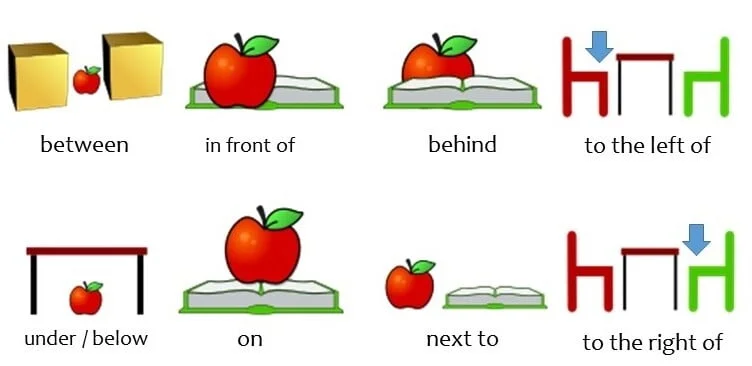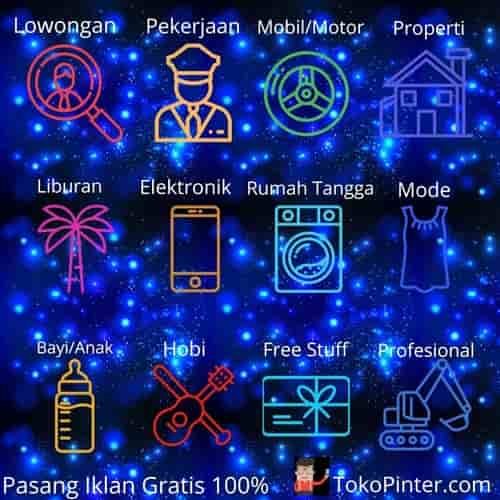Preposisi Bahasa Inggris – English Prepositions
Dalam bahasa Inggris, preposisi adalah kata-kata pendek (on, in, to) yang biasanya berdiri di depan kata benda (kadang-kadang juga di depan kata kerja gerund).
Dalam bahasa Indonesia, preposisi kata yang biasa terdapat di depan nomina, misalnya, dari, dengan, di, dan ke
Bahkan pelajar Bahasa Inggris tingkat lanjut merasa sulit menggunakan preposisi, karena terjemahan 1: 1 biasanya tidak mungkin. Satu preposisi dalam bahasa Indonesia mungkin memiliki beberapa terjemahan tergantung situasinya.
Hampir tidak ada aturan tentang kapan harus menggunakan preposisi yang mana. Satu-satunya cara untuk mempelajari preposisi adalah mencarinya di kamus, banyak membaca dalam bahasa Inggris (sastra) dan mempelajari frasa yang berguna dengan hati (tips belajar).
Tabel berikut berisi aturan untuk beberapa preposisi yang paling sering digunakan dalam bahasa Inggris:
Preposisi Waktu (Prepositions – Time)
Untuk memberi petunjuk waktu (at night, after lunch, during the storm).
| English | Usage (Penggunaan) | Example |
|---|---|---|
|
|
|
|
|
|
|
|
|
|
|
|
|
|
|
|
|
|
|
|
|
|
|
|
|
|
|
|
|
|
|
|
|
|
|
|
Preposition of Time adalah jenis kata depan yang berfungsi untuk menyatakan waktu. Berikut ini beberapa contoh preposition of time yang populer digunakan dalam percakapan bahasa Inggris, seperti in, on, at, for, since, before, after, until, till, by, during. Yuk, lihat penjelasan beserta contoh kalimatnya.
AT
At adalah contoh preposition of time yang digunakan untuk menyatakan jam, liburan, perayaan atau waktu spesifik lainnya. At artinya pada. Baca contoh kalimat berikut:
- That shop opens at 7.00 a.m. (Toko itu buka pada pukul 7.00 pagi.)
- I didn’t go home at night. (Aku tidak pulang pada malam hari.)
- It is always crowded here at Christmas time. (Di sini selalu rame pada saat Natal.)
IN
In adalah preposition of time yang digunakan untuk menunjukkan bulan, musim, tahun, atau periode waktu tertentu. In artinya pada. Baca contoh kalimat preposition in berikut:
- We will go in June. (Kita akan pergi pada bulan Juni.)
- I was born in 1995. (Saya lahir pada tahun 1995.)
- She drinks milk in the morning. (Ia minum susu pada pagi hari.)
ON
On adalah preposition of time yang digunakan untuk menunjukkan hari tertentu dalam seminggu, tanggal spesifik, dan hari-hari spesial. On artinya pada. Baca contoh kalimat preposition on berikut:
- I don’t have an extra course on Monday. (Aku tak ikut les tambahan pada hari Senin.)
- It is always fun on New Year’s Eve. (Selalu menyenangkan pada malam tahun baru.)
- My brother’s birthday is on Juli 30th. (Ulang tahun adikku pada tanggal 30 Juli.)
BEFORE / AFTER
Before / After adalah contoh kata depan bahasa Inggris yang digunakan untuk menunjukkan waktu sebelum atau setelah. Before artinya sebelum sedangkan After artinya setelah. Yuk baca contohnya.
- I’ll finish it before lunch. (Aku akan menyelesaikannya sebelum makan siang.)
- Sunday comes before Monday. (Minggu datang sebelum Senin.)
- After lunch, she does her homework. (Setelah makan siang, ia mengerjakan PR.)
- They are gonna leave after dawn. (Mereka akan pergi setelah fajar.)
FOR / SINCE
For / Since adalah contoh kata depan yang digunakan untuk menunjukkan kurun waktu tertentu dan waktu dimulainnya sebuah kegiatan. For dapat berarti selama sedangkan Since berarti sejak. Biasanya digunakan sebagai Keterangan Waktu dalam Kalimat Present Perfect Tense. Dengan melihat contoh kalimat di bawah ini kamu bisa melihat perbedaan keduanya.
- We have been friends for 10 years. (Kami telah berteman selama 10 tahun.)
- We have been friends since 2008. (Kami telah berteman sejak 2008.)

Preposisi – Tempat dan Arah / Prepositions – Place (Position and Direction)
Untuk memberi petunjuk tempat atau posisi (among his friends, inside my PC, outside the auditorium).
| English | Usage (Penggunaan) | Example (Contoh) |
|---|---|---|
|
|
|
|
|
|
|
|
|
|
|
|
|
|
|
|
|
|
|
|
|
|
|
|
|
|
|
|
|
|
|
|
|
|
|
|
|
|
|
|
|
|
|
|
|
Place and Direction adalah jenis kata depan yang berfungsi untuk menyatakan tempat, lokasi seseorang atau sebuah benda. Berikut ini beberapa preposition of place and direction yang sering digunakan dalam keseharian seperti in, on, at, under, above, below, between, among, next to, beside, in front of, up, down.. Yuk, lihat penjelasan beserta contoh kalimatnya.
AT
Selain sebagai preposition of time, At juga berfungsi sebagai kata depan yang menunjukkan suatu tempat atau lokasi pada sebuah titik, misalnya alamat. At berarti di / pada. Baca contoh kalimat yuk.
- I live at Ngurah Rai Street Number 99X. (Saya tinggal di Jalan Ngurah Rai Nomor 99X.)
- Anna is at home. (Anna ada di rumah.)
- Meet me at the airport tomorrow. (Temui saya di bandara besok.)
IN
In berfungsi sebagai kata depan yang menunjukkan tempat atau lokasi. In berarti di / di dalam (ruangan, kota). Perhatikan contoh kalimat yuk.
- There are many flowers in my garden. (Ada banyak bunga di kebun saya.)
- Don’t sleep in a car. (Jangan tidur di dalam mobil.)
- She was born in Sydney. (Ia lahir di Sydney.)
ON
On adalah contoh preposition of place yang berfungsi menunjukkan lokasi sebuah benda/seseorang di atas sebuah tempat. On artinya di atas. Coba lihat contoh kalimatnya berikut ini.
- A newspaper is on the table. (Koran ada di atas meja.)
- Don’t put your clothes on my bed. (Jangan letakkan pakaianmu di atas tempat tidurku.)
- Write it on a piece of paper. (Tulis itu di atas selembar kertas.)
UNDER
Under artinya di bawah. Yuk perhatikan contoh kalimat preposition berikut agar semakin paham penggunaan Under dalam bahasa Inggris.
- The key is under the fridge. (Kunci itu ada di bawah kulkas.)
- My dog isn’t sleeping under your bed. (Anjingku tidak tidur di bawah tempat tidurmu.)
- Who put those clothes under the pillow? (Siapa yang meletakkan pakaian di bawah bantal?)
BETWEEN / AMONG
Between / Among adalah contoh kata depan yang memiliki arti serupa yaitu di antara tapi maknanya nggak sama. Between itu dipake kalau di antara 2 benda/orang, sedangkan Among digunakan apabila di antara beberapa atau banyak benda/orang. Contoh:
- My office is between the bank and the shop. (Kantorku ada di antara bank dan toko.)
- Her office is among the tall buildings. (Kantornya berada di antara bangunan-bangunan tinggi)
BESIDE / NEXT TO
Between dan Next to adalah contoh kata depan yang berarti di sebelah / di samping. Kamu bisa gunakan kata depan ini apabila lokasi sebuah benda berada di dekat benda lainnya. Contoh:
- I am happy sitting next to you. (Aku senang duduk di sebelahmu.)
- My house is beside the supermarket. (Rumahku ada di sebelah supermarket.)

Preposisi Penting Lainnya / Other important Prepositions
Preposition of movement: untuk memberi petunjuk arah pergerakan (towards the post office, go up stairs, out of the hall).
| English | Usage (Penggunaan) | Example (Contoh) |
|---|---|---|
|
|
|
|
|
|
|
|
|
|
|
|
|
|
|
|
|
|
|
|
|
|
|
|
|
|
|
|
|
|
Preposisi Pengantar atau Instrumen (Preposition of Agent or Instrument)
Preposition of Agent or Instrument adalah jenis kata depan yang berfungsi untuk menyatakan cara sesuatu dilakukan. Beberapa contoh preposition of agent or instrument yang sering digunakan dalam keseharian seperti by, with, without.
BY
By artinya oleh. Biasanya digunakan untuk menyatakan cara atau pelaku yang melakukan sebuah tindakan. Kata depan bahasa Inggris ini sering digunakan dalam kalimat pasif. Yuk perhatikan contohnya.
- This novel was written by Harper Lee. (Novel ini ditulis oleh Harper Lee.)
- I will go there by train. (Saya akan pergi ke sana dengan kereta api.)
WITH / WITHOUT
With dan Without itu kayak lawan kata. With artinya dengan, sedangkan Without artinya tanpa. Agar lebih jelas, yuk perhatikan contoh berikut ini.
- She can write better with her own pen. (Ia bisa menulis lebih baik dengan pulpennya sendiri.)
- She can’t write well without her pen. (Ia tidak bisa menulis dengan baik tanpa pulpennya.)
- Won’t you come with me? (Tidakkah kamu ikut bersamaku?)
- Will you guys go without me? (Akankah kalian pergi tanpa aku?)
Preposisi Dasar Lainnya
Saya nggak bisa jelasin semua contoh preposition dalam tabel satu per satu. Itu akan membuat artikel ini terlalu panjang dan membosankan. So, saya pilih preposition yang sering digunakan dalam percakapan bahasa Inggris sehari-hari.
Dalam subpoin ke-6 ini, kita bahas dua preposition lainnya yaitu Of, To.
OF
Of artinya dari. Preposition of berfungsi untuk menyatakan kepemilikan (possession) dan menyatakan jumlah (quantity). Lihat contoh berikut.
- This is the bag of my uncle’s girlfriend. (Ini adalah tas dari pacar pamanku.)
- She ate three bowls of chicken soup. (Ia makan 3 mangkuk sup ayam.)
- They got a discount of 75 percent. (Mereka mendapatkan diskon 75 persen.)
TO
To adalah salah satu kata depan bahasa Inggris yang paling populer digunakan. To bisa digunakan untuk menyatakan tempat, bisa pula menunjukkan peruntukan, dan dapat juga menyatakan waktu. To artinya ke, sampai, untuk. Contoh:
- I go to school from Monday to Friday. (Aku pergi ke sekolah dari Senin sampai Jumat.)
- Please send this letter to her. (Tolong kirim surat ini untuknya.)
- All of us went to Peninsula Island. (Semuanya pergi ke Pulau Peninsula.)
Contoh Gabungan Kata-Kata Preposisi / Prepositional Phrase
Preposisi bisa rumit. Satu masalah adalah seringkali tidak ada logika sama sekali! Kami menggunakannya dalam banyak ungkapan dan sayangnya, kami hanya perlu mempelajarinya dengan hati. Sebenarnya tidak ada aturan.
(Mari kita sebut ‘preposisi kata-kata’ ini tetapi kadang-kadang orang menyebutnya ‘frasa preposisi’ atau ‘ekspresi preposisi’.)
Prepositional Phrase
Kombinasi antara preposition dengan object of preposition membentuk suatu frasa yang disebut prepositional phrase. Preposition yang membentuk prepositional phrase tersebut dapat hanya terdiri dari satu kata (one word preposition: at, on, it), atau gabungan dengan part of speech lain (complex preposition: along with, as well as, by means of).
Contoh Prepositional Phrase: under the bridge, at school, because of you.
Prepositional phrase dapat dibedakan menjadi adjectival prepositional phrase dan adverbial prepositional phrase. Adjectival berfungsi seperti adjective yang menerangkan noun, sedangkan adverbial berfungsi seperti adverb yang menerangkan verb, adjective, atau adverb.
1. At last = finally
- After a long journey, at last we arrived at our hotel.
- At last! I thought you’d never get here!
2. On foot = walking (NOT by foot)
- I usually go to work on foot.
- Did you come by car or on foot?
3. By mistake = not meaning to
- I dropped the glass by mistake. I’m really sorry.
- She gave him the wrong book by mistake.
4. In advance = beforehand
- We need to book the tickets for the cinema in advance, or we won’t get a good seat.
- She always buys her food for Christmas well in advance.
5. Out of reach = too high to touch (literally or metaphorically)
- She tried to grab the kite as it flew away but it was already out of reach.
- That job is out of reach. I don’t have the right qualifications for it.
6. For instance = here is an example
- John reads a lot. For instance, yesterday he read two books.
- You should eat more vegetables. Why don’t you have a salad at lunchtime, for instance?
7. In danger = in a dangerous situation
- When the car started rolling we realised that we were in danger. Luckily we managed to stop.
- The dog fell into the river and was in danger for several minutes.
8. Without fail = always / definitely
- She visits her mother every week without fail.
- I study for twenty minutes a day without fail.
9. By chance = without planning
- I saw Natasha at the station by chance.
- She found the perfect book by chance in a second hand bookshop.
10. On purpose = intending to do something
- She left without paying on purpose! It wasn’t a mistake.
- Did you take my bag on purpose? Why would you do that?
11. For a change = to do something different
- Let’s have Italian food for a change. We always eat British food.
- I don’t want to go to the cinema again. I want to go to the park for a change.
12. On time (for) = at the time that was arranged
- She was on time for the meeting. It started at nine and she arrived at nine.
- Why are you never on time? I’m so fed up with waiting for you.
13. To my surprise = I was surprised
- I opened the door, and to my surprise, it was Lucy! I’d thought she was in Paris.
- To his surprise, the baby stopped crying and smiled at him.
14. At once = immediately
- You must do it at once! Don’t wait even one minute.
- She cleaned up at once when she realised that her mother was coming to visit.
15. In common (with) = something that’s shared or the same
- People from different countries have a lot in common. We all want to have good lives.
- What does a cat have in common with a mouse? Well, they are both mammals.
Contoh Preposisi Bahasa Inggris
Dalam tabel berikut dilengkapi dengan artinya dan contoh kalimat.
Contoh Preposition | Artinya | Contoh Kalimat Preposition |
|---|---|---|
| About | Tentang | She talked about her trip. |
| Above | Di atas | We flew above the clouds. |
| According to | Menurut | According to Rick, it’s delicious. |
| Across | Di seberang | They walked across that bridge. |
| After | Setelah | I should leave after breakfast. |
| Against | Melawan | Is it against the law? |
| Along | Sepanjang | Did you walk along the road? |
| Amid | Di tengah-tengah | We found our task amid those papers. |
| Among | Di antara | She is sitting among the dogs. |
| Around | Sekitar | The Earth goes around the Sun. |
| As | Sebagai | My sister works as a blogger. |
| At | Di, pada | She arrieved at 7.00 a.m. |
| Before | Sebelum | Where did you go before school? |
| Behind | Di belakang | Who is the little girl behind her? |
| Below | Di bawah | Write your name below this line. |
| Beneath | Di bawah | That boat sank beneath the waves. |
| Beside | Di samping | The clock is beside the book. |
| Between | Di antara | The fridge is between those shelves. |
| Because of | Karena | We moved here because of our baby. |
| Beyond | Melampaui | It is beyond my expectation. |
| By | Oleh, dengan | We went by car. |
| Concerning | Tentang | He asked me concerning his carrier. |
| Down | Ke arah bawah | We live just down the street. |
| During | Selama | We were in China during the summer. |
| Except | Kecuali | We all like pizza except Peter. |
| Far | Jauh | The bank is far from here. |
| For | Untuk, selama | This letter is for you. |
| From | Dari | This parcel is from our neighbour. |
| In | Di, pada | She lives in London. |
| In front of | Di depan | A pretty girl sits in front of you. |
| Into | Ke | Come into my house! |
| Inside | Dalam | These clothes are inside the box. |
| Instead of | Daripada | We should eat fruit instead of candy. |
| Like | Seperti | She is just like you. |
| Near | Dekat | I stay near here. |
| Next to | Di samping | We sat next to each other. |
| Of | Dari, pada | This is a picture of my family. |
| Off | Keluar, menjauh | Keep off the grass. |
| On | Di, pada | Those books are on my bed. |
| Onto | Di / ke atas | The cat climbed onto the roof. |
| Opposite | Di seberang | That shop is opposite the bank. |
| Outside | Di luar | Those books are outside the box. |
| Out | Di / ke luar | Her dog is out from the house. |
| Out of | Keluar dari | He is now out of danger. |
| Over | Di atas | My flat is over the minimart. |
| Past | melewati | I walked past her house. |
| Round | mengelilingi | We will travel round the country. |
| Since | Sejak | She has changed since the age of 21. |
| Than | Dari / daripada | I am shorter than my brother. |
| Through | Melalui | Did you get in through the window? |
| Till | Sampai | Will he be outside till 10 o’clock? |
| To | Ke, untuk, sampai | She walks to school. |
| Towards | Menuju | He was walking toward his office. |
| Under | Di bawah | Her bag was under the table. |
| Underneath | Di bawah | The pen is underneath the sofa. |
| Until | Sampai | My partner worked until midnight. |
| Unto | Sampai, kepada | She appeared unto him in a dream. |
| Up | Di / ke atas | They live just up the road. |
| Upon | Di atas | I cannot stand upon a skateboard. |
| With | Dengan | My brother lives with our parents. |
| Within | Dalam | Can you finish it within a month? |
| Without | Tanpa | We will go without our dogs. |
Contoh Soal Preposisi Bahasa Inggris
1. Go to the right side to find a café (Pergi ke sisi kanan untuk menemukan kafe).
Penjelasan: Dalam contoh kalimat ini, preposition yang ada hanya terdiri atas satu kata, yakni “to” (ke), untuk menjelaskan tentang arah pergi ke “the right side” (sisi kanan).
2. Those dolls have been here since 1997 (Boneka-boneka itu sudah ada di sini sejak 1997).
Penjelasan: Contoh kalimat ini juga memperlihatkan penerapan preposition yang hanya mengandungi satu kata, yakni “since” (sejak), untuk menggambarkan fungsi penjelas waktu dari keadaan “those dolls have been here” (boneka-boneka itu sudah ada di sini).
3. The plan is cancelled due to company’s changing policy (Rencananya dibatalkan mengingat adanya perubahan peraturan perusahaan).
Penjelasan: Untuk menjelaskan alasan “the plan is cancelled” (rencananya dibatalkan), contoh kalimat ini menggunakan preposition yang terdiri atas dua kata, yakni “due to” (mengingat).
4. You can find my trophy on top of my shelves (Kamu dapat menemukan pialaku di atas rakku).
Penjelasan: Preposition yang digunakan dalam contoh kalimat ini juga berjumlah dua kata, yakni “on top” (di atas). Preposition ini digunakan untuk menyatakan lokasi dari “my trophy” (pialaku).
5. She lives … Sydney. (in / on / at)
Jawaban: She lives in Sydney.
6. I will come … your house … 7.30 a.m. (for / to / in / on / at)
Jawaban: I will come to your house at 7.30 a.m.
7. This – girlfriend – photo – my – is – a – of
Jawaban: This is a photo of my girlfriend.
8. Only some … my friends are very kind. (to / of / for)
Jawaban: Only some of my friends are very kind.
9. We play together … school. (under / between / after)
Jawaban: We play together after school.
10. We put the key … this desk. (in / on / at)
Jawaban: We put the key on this desk.
11. Her cat is … those boxes. (between / to / of)
Jawaban: Her cat is between those boxes.
12. This package is … your uncle. (for / at / above)
Jawaban: This package is for your uncle.
13. What time do you usually arrive … school? (to / at / on)
Jawaban: What time do you usually arrive at school?
14. They will be back … Thursday morning. (in / at / on)
Jawaban: They will be back on Thursday morning.
15. He came here … night. (in / at / on)
Jawaban: He came here at night.
16. a – Her – chair – under – purse – was – yellow
Jawaban: Her purse was under a yellow chair.
17. party – met – They – a – at
Jawaban: They met at a party.
18. battery – We – phone – a – new – need – the – for
Jawaban: We need a new battery for the phone.
19. men – She – handsome – is – two – between – sitting
Jawaban: She is sitting between two handsome men.
20. I applied _____ the university of melbourn. I applied ____ admission to the Harvard University.
Jawaban: to, for
21. I borrowed this dictionary_____ Pedro.
Jawaban: to
21. I admire my father _____ his honesty and intelligance.
Jawaban: for
22. Could you please help me _____ these heavy suitcases?
Jawaban: to bring
23. I discussed my educational plans ____ my parents.
Jawaban: with
24. Jessica, would you like me introduce you _______ Sarah?
Jawaban: to
25. Are you laughing _____ my mistakes?
Jawaban: at
26. You shouldn’t stare ______ other people. it’s not polite.
Jawaban: at
27. Do you believe _____ ghosts?
Jawaban: in
28. Marco Polo traveled _____ China in the thirteenth century.
Jawaban: to
29. I argued _____ Johnny _____ politics.
Jawaban: with, to
30. Paula applied _____ a job at the automobile factory.
Jawaban: for
31. She paid for lunch _____ advance, so we don’t need to pay now.
Jawaban: in
32. I went to the wrong house _____ mistake.
Jawaban: by
33. Please make sure that you’re _____ time for the class.
Jawaban: on
34. I was walking to the station and _____ chance I saw the glove that I’d lost on the ground.
Jawaban: by
35. I love eating out in London. _____ instance, one of my favourite restaurants has amazing Japanese food.
Jawaban: For
36. I think the cat is _____ danger on that high roof.
Jawaban: in
37. I picked up the laptop and _____ my surprise it fell apart in my hands.
Jawaban: to
38. I have a lot _____ common with my cousin. We both like many of the same things.
Jawaban: in
39. If the baby starts to cry, pick her up _____ once.
Jawaban: at
40. Did you forget your purse _____ purpose so you wouldn’t have to pay?
Jawaban: on
Ingin Lebih Pintar? Ketahuilah Grammar Bahassa Inggris Yang Lengkap!
Klik disini untuk mengetahui: Grammar Bahasa Inggris Lengkap (English Grammar) – Tata Bahasa Inggris Contoh Soal dan Jawaban

